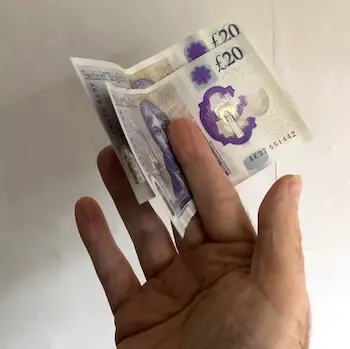To ‘fork out’ is to hand over a sum of money. The expression is often used when the payee is rather unwilling to pay a large amount. For example, “I had to fork out £200 to repair the scratch my daughter made on the car”.
Fork out
What's the meaning of the phrase 'Fork out'?
What's the origin of the phrase 'Fork out'?
The expression ‘fork out’ entered the language in England in the mid-19th century. On the face of it there doesn’t appear to be a connection between forking and paying/handing over.
The connection is that fork was a slang term for ‘pickpocket’. This is recorded in Nathan Bailey’s, Etymological English Dictionary, 1737:
“FORK, a Pick-pocket. Lets Fork him; Let us pick that Man’s Pocket. It is done by thrusting the Fingers, strait, stiff, open and very quick into the Pocket, and so closing them, hook what can be held between them.”
hold it between your fingers, as a
pickpocket would do.
The term ‘fork-out’ came to be used to mean ‘pay/surrender’ or ‘hand over’ money. The allusion was to the fingers of one’s hand being used to hold the money, like a pickpocket.
The first example that I can find of ‘fork out’ in print is from the London newspaper The Observer, April 1825:
He was obliged to fork out a good deal of money to some creditors.
The connection between forks and fingers was also used in the derivation of another slang phrase – ‘put up your dukes‘. By a Cockney rhyming slang route, that links fingers, that is forks, to dukes (of Yorks).
The history of “Fork out” in printed materials
Trend of fork out in printed material over time
Related phrases and meanings
Browse more Phrases
About the Author

Phrases & Meanings
A-Z
A B C D E F G H I J K L M N O P Q R S T UV W XYZ
Categories
American Animals Australian Bible Body Colour Conflict Death Devil Dogs Emotions Euphemism Family Fashion Food French Horses ‘Jack’ Luck Money Military Music Names Nature Nautical Numbers Politics Religion Shakespeare Stupidity Entertainment Weather Women Work
How did we do?
Have you spotted something that needs updated on this page? We review all feedback we receive to ensure that we provide the most accurate and up to date information on phrases.
